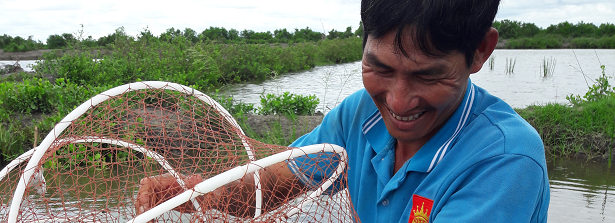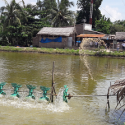Are shrimp farmers actual gamblers?

Olivier M. Joffre, P. Marijn Poortvliet and Laurens Klerkxc published a research article in Aquaculture, entitled “Are shrimp farmers actual gamblers? An analysis of risk perception and risk management behaviors among shrimp farmers in the Mekong Delta”. The article was written in the framework of the Global Challenges Programme project “Nutritious-system pond farming in Vietnam” executed by main project partners WorldFish, Skretting-Vietnam, Can Tho University and Wageningen University & Research.
Please find below the abstract of of this open access publication and a link to the full research article.
Abstract
Shrimp farming is considered a “risky business” and often compared to gambling for farmers. It is associated with a diverse range of risks and uncertainties, including volatile markets, climate variability, and production risks. In order to mitigate the effects of unpredictability farmers may decide on a particular stocking density and adopt different risk management strategies. Aquaculture research has paid little attention to the influence played by the evaluation and selection of different farming practices, risk perceptions associated with shrimp farming, and the farmers’ confidence in their own ability to mitigate risk. The objective of this paper is to analyze the case of shrimp farming in Vietnam’s Mekong Delta, where different types of shrimp farms (extensive, semi-intensive and intensive) co-exist within the same landscape, to identify the underlying factors driving stocking behavior and the adoption of different risk management strategies.
A survey of 250 farms showed that perceptions toward different stocking behaviors (from extensive to intensive) varied according to the species raised (Penaeus monodon or P. vannamei) and the type of farm. At low density, farmers consider P. monodon as more productive and easier to adopt than P. vannamei. Adoption of intensive farming practices for both species is negatively associated with risk of disease emergence. However, expected productivity is not a predictor of adoption of intensive shrimp farming practices. Mediation analysis indicates that risk management strategies are significantly influenced by perceived market risk. The perception of this type of risk is a key predictor of risk management strategies. The farmers’ lack of access to efficient market risk mitigation measures reflects inadequate or missing regulations or lack of specific value chain organization to mitigate this type of risk. Using a behavioral approach provides new insight on how farmers manage their farms, address risk and implement risk management strategies. It showed that farmers, unlike actual gamblers, adopt diverse management strategies after carefully evaluating species and stocking density as well as critically assessing different sources of risk.






